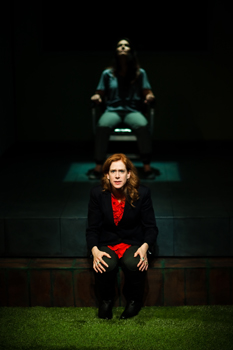It’s Not Easy Being Queen
Sam
Hurwitt
Thursday, October 28
The
Idiolect
As acclaimed as he is for original works such as Shotgun Players’ The Death of Meyerhold and The Forest War, what’s particularly fascinating about local writer-director Mark Jackson’s work is his treatment of classic texts, from inventive stagings of Shakespeare’s Macbeth for Shotgun and Strindberg’s Miss Julie at Aurora to dizzying choreography-oriented desconstructions such as Juliet at San Francisco State and his Three Sisters riff Yes, Yes to Moscow at the San Francisco International Arts Festival. Somewhere in between are his adaptations, which bear the unmistakable mark of his strong visual and highly stylized approach while remaining much more of a conversation with the original work than a reinvention of it.
Having tackled the towering figure of German literature, Goethe, with last year’s radically slimmed-down adaptation of Faust Part 1, Jackson and Shotgun now move on to Goethe’s contemporary and countryman Friedrich Schiller’s 1800 drama Mary Stuart, about the last days of Mary, Queen of Scots.
Having been forced to surrender her Scottish throne and flee to England nearly 20 years before, the Catholic Mary was executed in 1587 for plotting to assassinate her Protestant cousin Queen Elizabeth and assume the English throne. When we catch up with her in the play, Mary is in custody, demanding to know what she’s accused of and what’s to be done with her. Elizabeth’s advisors are furiously debating the question of whether they can execute Mary without an uproar from the citizenry.
Nina Ball’s sleek, modern, and deceptively simple-looking set depicts a sterile interrogation room with mostly gray walls, a spotlighted chair in the center, and a dark window behind it that’s clearly for observation from outside. Two long meeting tables run along the sides of the stage, and two matching doors lead to long corridors that are sometimes visible on video screens perched atop the walls. At other times the videos, directed by Chris Paulina, zoom in on the prisoner’s face from different angles.
David Graves’s sound design is an occasionally jarring mix of undecipherable intercom announcements, static and the roar of planes. An ominous keyboard hum and ticking noise underscore Mary’s long monologues, and loud resonant slamming noises sometimes close tense scenes. Costumer Christine Crook has dressed most of the cast in slick dark suits, except Mary in a gray T-shirt and pants and Elizabeth in blazer, tights and riding boots.
Stephanie Gularte maintains a marvelous intensity as Mary, who sits in the chair for most of the play, whether or not she’s in a scene. She reels back and forth between desperation, resignation, and firebrand fury as she tries to get a straight answer about her fate and strives to get a meeting with her “sister” queen, Elizabeth. At one point she acts as her own confessor, taking on a hostile, badgering voice for the imagined priest. She speaks very quickly in her long monologues, in which she readily confesses to luring her husband to his death and marrying his murderer but adamantly denies the crime of which she’s accused, that of plotting to assassinate Elizabeth. In any case she maintains that she’s not a subject of English law but “the free queen of a foreign land”
Peter Ruocco is the most insistent voice calling for her death as Burleigh, a very familiar kind of smug bureaucrat who sticks to his talking points and tries to ensnare others in rhetoric. Hearing him debate his opponents is like watching a Bush administration official on The Daily Show, only less chummy. John Mercer is a passionate voice for restraint as the earnest Shrewsbury, and Jesse Caldwell’s avuncular Paulet is more of a puzzle: He’s first seen angrily interrogating Mary and warning her to prepare for death, but after that he does what he can to help her. A smoothly duplicitous Ryan Tasker makes a fascinating puzzle as Paulet’s nephew Mortimer, who first appears as an ardent Catholic convert who swears to help Mary then tells Elizabeth that he’s only posing as a Catholic to manipulate Mary and uncover a conspiracy. We soon find out exactly which side Mortimer is really on, but the more we find out about what he’s thinking, the more unnerving it is.
Scott Coopwood is especially compelling as Leicester, who was engaged to Mary before moving on out of political expediency, and would like to save her if it doesn’t involve sticking his own neck out too much. Even before he says a word, he commands attention while fixedly watching the other advisors speak and keeping his thoughts to himself until his input is specifically sought out and will have the most impact. He’s a delight to watch in his mutually suspicious conspiring with Mortimer, openly hostile confrontations with Burleigh, and cynical but smooth as silk flattery of Elizabeth.
Beth Wilmurt is at first placid and almost robotically unreadable as Elizabeth, but in a way that’s not just intentional on both Wilmurt’s and Elizabeth’s parts but also feels necessary. Great significance is placed on the queen’s every reaction, so it’s as if she’s learned to react as little as possible. At one point she walks up to Mortimer and stares into his face silently, nearly nose to nose, for a long time. Then she walks away and commends his art of deception. It’s a tense moment not just because she’s subjecting him to such close scrutiny but because it’s such a weird thing to do.
Her composure crumbles around Mary, with whom she’s so wary that Elizabeth circles her at wide distance, at times literally pressed against the wall. Although she’s too cold-blooded to be sympathetic, Elizabeth makes an eloquent argument for the powerlessness of power, so paralyzed by the political ramifications of anything she might do that she tries not to make a move that she can’t later deny.
This obsession with deniability begins to approach a fascinating pinnacle of sophistry as Elizabeth longs to be rid of Mary without saying so directly. There’s a marvelous scene between Elizabeth and Dara Yazdani as minor functionary Davison in which she signs an order but refuses to tell him whether or not he should actually deliver the order. “Do what it is your duty to do,” she says. Elizabeth knows exactly what she wants him to do but won’t take the responsibility to say it, and the mounting frustration on both sides is marvelous as he demands to be told explicitly what to do and she continues to talk around it, furious with him for not taking the hint.
The contemporary parallels to things like Guantanamo are obvious, even without lines like Burleigh’s dubious insistence that “We do not torture.” When she’s badgered with hearsay accusations of trying to overthrow the government and its church, Mary asks why she’s not allowed to confront her accusers and finally exclaims in frustration, “I’ve done no such things, and now I wish I had done such things.”
It takes a while to get used to the expository speeches at the beginning, but as the two-hour production builds it becomes a nail-bitingly tense political drama full of convoluted machinations. It’s The West Wing as Machiavelli might have written it.




